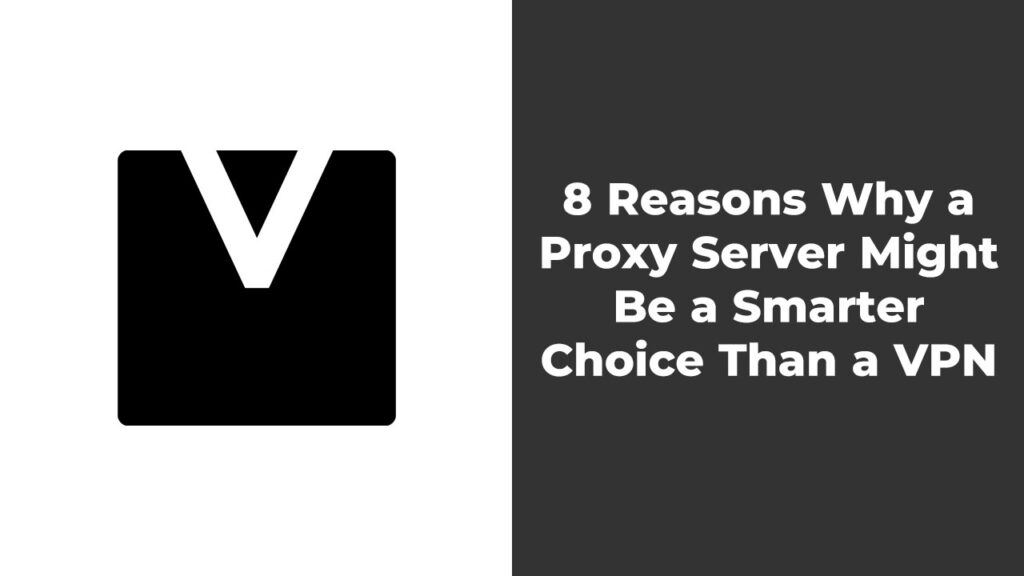VPNs (Virtual Private Networks) are widely known for their ability to encrypt internet traffic and protect your privacy online. They’re the go-to solution for people who deal with sensitive data or need strong anonymity. However, that doesn’t mean VPNs are always the most practical tool for everyday internet use. In many scenarios—such as casual browsing, accessing region-locked content, or managing office traffic—a proxy server may actually provide a faster, simpler, and more efficient alternative.
Here are eight compelling reasons why using a proxy might be a better option than relying solely on a VPN:
1. Instant Access Without Installation or Configuration
One of the biggest advantages of proxy servers is that they’re often available right in your browser. Many proxy providers offer web-based access or simple browser extensions that let you bypass geographic restrictions or blocked websites with just a click—no need for installation, configuration, or system-level changes.
This is particularly helpful for users on restricted or public devices, such as school computers, office PCs, or shared library terminals. If installing software is impossible or inconvenient, using a browser-based proxy can be the fastest way to access the content you need.
2. Faster Speeds for Everyday Use
While VPNs route all your internet traffic through encrypted tunnels, proxies focus on specific traffic, like your web browser or a single app. This selective routing means there’s less computational overhead and often higher speeds, especially when encryption isn’t necessary.
If you’re performing tasks that don’t require total anonymity—like checking prices in other countries, bypassing a local block, or running lightweight automation scripts—a proxy server gets the job done faster and more efficiently than a VPN, which may slow you down due to complex encryption processes.
3. Seamless Access to Geo-Locked Content
Trying to watch a show that’s only available in another country? Proxy services, especially Smart DNS proxies, are excellent tools for unblocking streaming platforms such as Netflix, BBC iPlayer, Hulu, or Disney+. Smart DNS doesn’t route all your traffic—it just redirects DNS requests (which are like address lookups) to make it appear that you’re in another region.
Since there’s no encryption involved, your internet speed stays high, and streaming is smooth and buffer-free. Many users abroad—expats, digital nomads, or travelers—prefer Smart DNS proxies for this exact reason.
4. Bandwidth Savings with Cached Content
Proxies aren’t just middlemen—they can also store content locally through caching. For example, if several users in a home or office access the same websites or download the same files, a proxy server can store that content once and serve it locally to everyone else.
This caching dramatically reduces repeated bandwidth usage, saves internet data, and improves page loading times. It’s especially useful in schools or businesses where dozens of users may access the same training materials, videos, or platforms throughout the day.
5. Simple IP Masking Without Full Encryption
Let’s say you just want to hide your IP address while browsing, or access a website that’s unavailable in your region. In this case, using a VPN may be overkill. Proxy servers give you basic anonymity by hiding your IP address, without the performance hit that comes from encrypting all your traffic.
Since there’s no encryption layer, proxies tend to be faster and more lightweight—making them ideal for less sensitive but still privacy-conscious tasks.
6. Efficient Network Management at Scale
For IT administrators, proxies provide a powerful way to monitor, filter, and control internet use across an entire network. Unlike VPNs, which typically serve individual users, proxies can handle dozens or even hundreds of devices simultaneously.
Businesses use proxies to enforce browsing policies, block inappropriate websites, and monitor data usage. Parents may use them at home to restrict access to adult content or social media. Since traffic can be analyzed or redirected through custom rules, proxies give much more granular control over network activity.
7. Advanced Traffic Handling via Reverse Proxies
While most people think of proxies as tools for end users, reverse proxies serve the opposite purpose. They sit in front of web servers and act as gatekeepers, handling incoming requests, distributing traffic, protecting backend servers from DDoS attacks, and improving performance.
Web hosting services like Cloudflare, AWS CloudFront, or NGINX use reverse proxies to balance server loads and provide extra security. If you run a website or app and want to protect your infrastructure while scaling traffic efficiently, using a reverse proxy is more relevant than any VPN.
8. Simpler Solution for Non-Sensitive Tasks
Finally, the truth is that not all online activity needs military-grade security. If you’re casually watching videos, reading blogs, checking product availability, or even doing SEO analysis in other countries, a full VPN setup is often more complex than needed.
Proxies are a quick, low-maintenance solution for these kinds of routine tasks. They don’t bog down your system, don’t require user accounts or subscriptions (in many cases), and can often be toggled on or off with a browser extension or simple app.
Conclusion: Pick the Right Tool for the Job
At the end of the day, choosing between a proxy and a VPN comes down to what you’re trying to accomplish. If you’re handling confidential data or working on an unsecured network like public Wi-Fi, a VPN is clearly the better choice due to its strong encryption and full protection.
But for a wide range of practical, everyday needs—speed, simplicity, streaming access, and network control—a proxy server might be the smarter, faster, and more cost-effective option.
So before you jump into another VPN subscription, take a moment to consider: maybe a proxy is all you really need.









